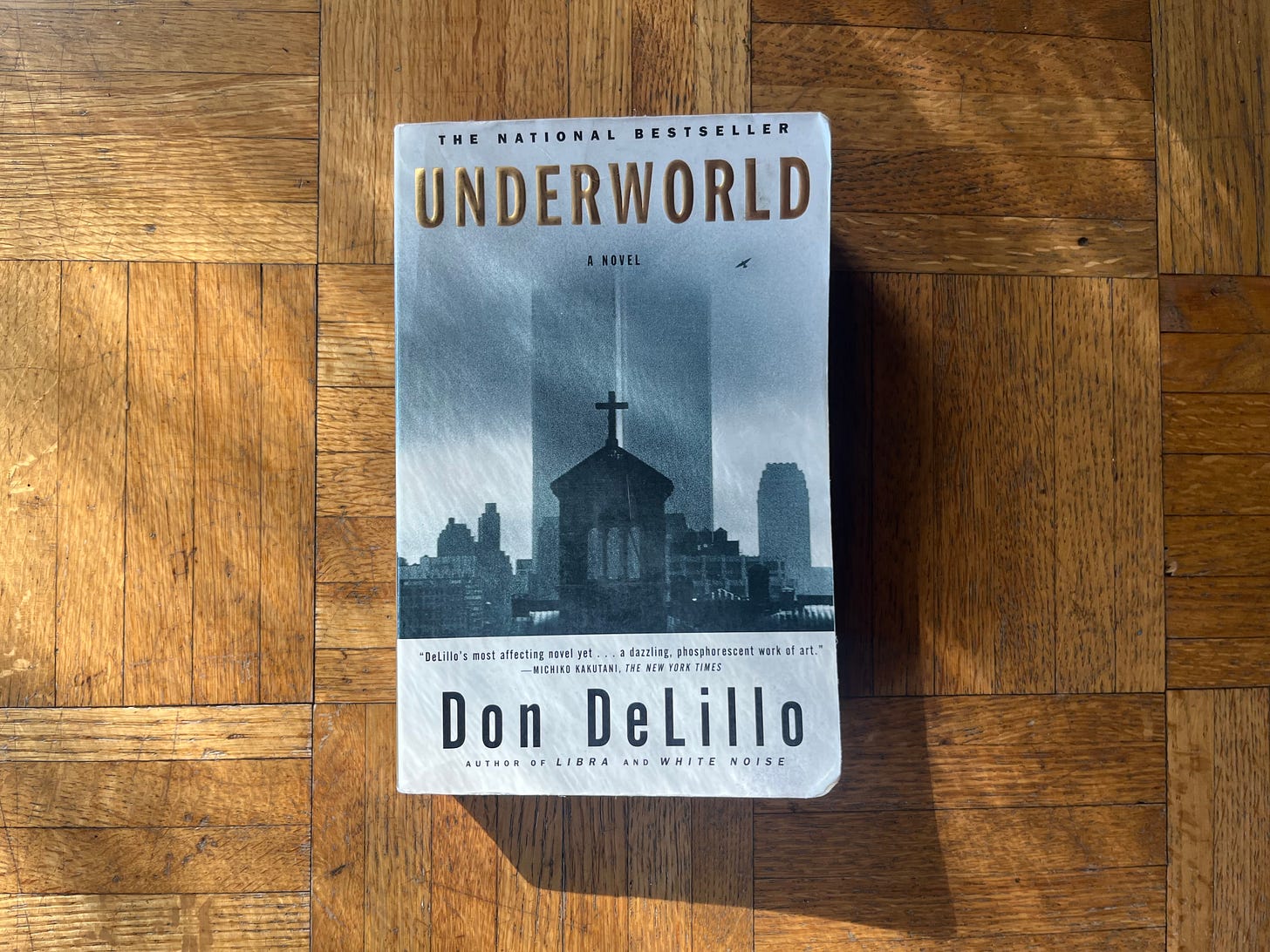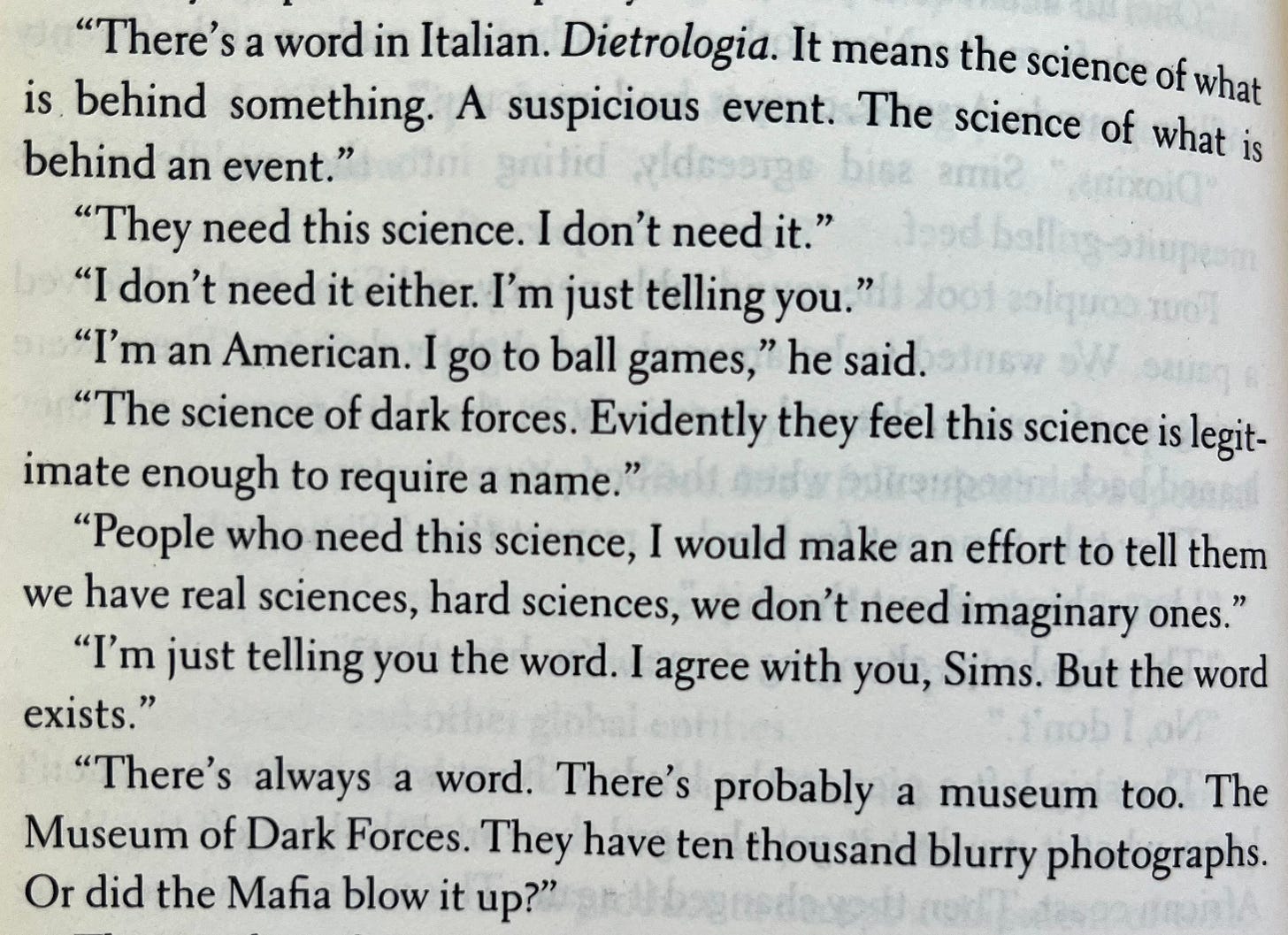Writers and their underworlds
On Don DeLillo's "Underworld."
Seeking one thing in literary fiction, you often find another. Shortly after Charlie Kirk’s assassination a month ago, I picked up Don DeLillo’s 1997 novel “Underworld.” Not a typical response to an assassination for a journalist, admittedly. Especially one of the few American news stories to actually slip through the girders of our half-collapsed information economy in 2025.
Over the years I’ve grown increasingly hostile to the constricted perspectives lone gunmen force on our lines of vision. Not through the necessary reporting of journalistic fact, but the hostage-like role of the media consumer encountering the work product of attention-hijackers across all platforms. Video of a famous person getting shot says — what, exactly? Have I become wiser by encountering snuff footage and the shooter’s shitty little ironic manifestos? When did nihilists start doing so much growth marketing?
I had hoped DeLillo, a prescient observer of the American paranoid, could decrypt the glyphic nonsense that dark forces keep scrawling into our life stories. But I mis-stepped — went subsurface — tumbled through to a whole different catacomb of the American pysche’s relationship with terror, the parts of the story that are about ourselves.
“Underworld” was DeLillo’s first “post-paranoid” novel, the 20th-century twilight of “the days when we knew the score: it was whatever the authorities were not telling us,” as critic Michael Wood wrote of the post-JFK-assassination years. “Conspiracy theory wasn’t even a theory, it was a basic interpretative procedure, a way of getting through the week.” By the 1990s, the idea of an all-powerful Smoking Man pulling the strings had become a subject of amusement. The popularity of TV’s “X-Files” signaled market maturity for grassy-knollists as a consumer bloc, but the show poorly predicted the insane nationalist innovations of QAnon two decades later. Between Mulder and Scully, as a friend observed, the more evidence-based bureaucratic skeptic of the pair is coded as the cultural conservative.
“Underworld” is a sprawling saga of nearly 50 years of American life under the atomic bomb, the creation of which was the mother of all real-life conspiracies. The novel is structured like a TikTok for-you feed, flitting across characters, states and decades in fragmentary random, connected only by DeLillo’s proprietary perceptions of the threads pulling everybody through the Cold War. The media-poisoned lone gunman appears, then disappears, as a plot point: TV-watchers sit transfixed by TV footage of victim getting shot on a highway, and then move onto the next distraction. The killer is just some guy. Notes of conspiracy appear elsewhere, but ironically:
Sometimes, there weren’t really sensible explanations for things to happen at all, even and sometimes especially manslaughter (I won’t spoil the novel’s concluding reveal). “Underworld” obsesses over the extraordinary metaphorical and literal waste a society generates while caroming between love, fear, hatred, dumb horniness, boredom. A sanitation expert stares at a dump and realizes what his job is all about:
Not engineering or transportation or source reduction. He dealt in human behavior, people’s habits and impulses, their uncontrollable needs and innocent wishes, maybe their passions, certainly their excesses and indulgences but their kindness too, their generosity, and the question was how to keep this mass metabolism from overwhelming us.
The landfill showed him smack-on how the waste stream ended, where all the appetites and hankerings, the sodden second thoughts came runneling out, the things you wanted ardently and then did not. … The biggest secrets are the ones spread open before us.
It reminded me: As suddenly as the Kirk shooting appeared as a tragedy, it morphed into political controversy, then became one more piece of informational and emotional clutter dumped into a media environment that only becomes more congested, heaped-upon and lonesome by the second. Capturing this overwhelming clutteredness is a central requirement of anyone who wants to say something comprehensive about the social impact of an event even as singular as an assassination. In “Underworld,” this sprawlingness of collective life was a conscious aesthetic choice to reflect the American experience, as David Remnick reported in a 1997 New Yorker profile:
For a long time, DeLillo has been interested in the passage in John Cheever’s journals where he wrote, after attending a ballgame at Shea Stadium, “The task of an American writer is not to describe the misgivings of a woman taken in adultery as she looks out of a window at the rain but to describe 400 people under the lights reaching for a foul ball . . . [or] the faint thunder as 10,000 people, at the bottom of the eighth, head for the exits. The sense of moral judgments embodied in a migratory vastness.”
But where it takes the old-fashioned omniscient technology of the novelistic narrative to capture this kind of human breadth, most people in real life are being pummeled flat by the pneumatic force of video. It was DeLillo’s close observation of this warping power of visual media that gives him a prefigurative, foreboding prescience for our YouTube-powered sensory reality in 2025. As DeLillo told Remnick from an interview almost three decades ago:
This happens repeatedly in those endless videotapes that come to life of a bank robbery, or a shooting, or a beating. They repeat, and it’s as though they’re speeding up time in some way. I think it’s induced an apocalyptic sense in people that has nothing to do with the end of the millennium. And it makes us—it makes us consumers of a certain type. We consume these acts of violence. It’s like buying products that in fact are images and they are produced in a mass-market kind of fashion. But it’s also real, it’s real life. It’s as though this were our last experience of nature: seeing a guy with a gun totally separate from choreographed movie violence. It’s all that we’ve got left of nature, in a strange way. But it’s all happening on our TV set.
You can also choose to turn off the screen, especially if you want to be pulled along by other forces. You can even become a reclusive author! “Writing is a form of personal freedom,” DeLillo wrote separately in a letter to Jonathan Franzen. “It frees us from the mass identity we see in the making all around us. In the end, writers will write not to be outlaw heroes of some underculture but mainly to save themselves, to survive as individuals.” Here, I’m interested by the writer’s potential ability to tunnel past a gunman’s images and manifesti, all the surface layers of propaganda, in order to excavate something of meaning.




My tv antenna broke three or four years ago and I just tuned out. Never home when network news was on, didn't watch local. I stream the occasional news conference and spectacles like NoKings on my phone and listen to MSNBC audio and NPR. Assassinations, school shootings, etc, never seen. Relying on print news has turned me into a social illiterate. I like it like dat. Thanks for the insights.
Great commentary and appreciation… Whatever happened to Jonathan Franzen?